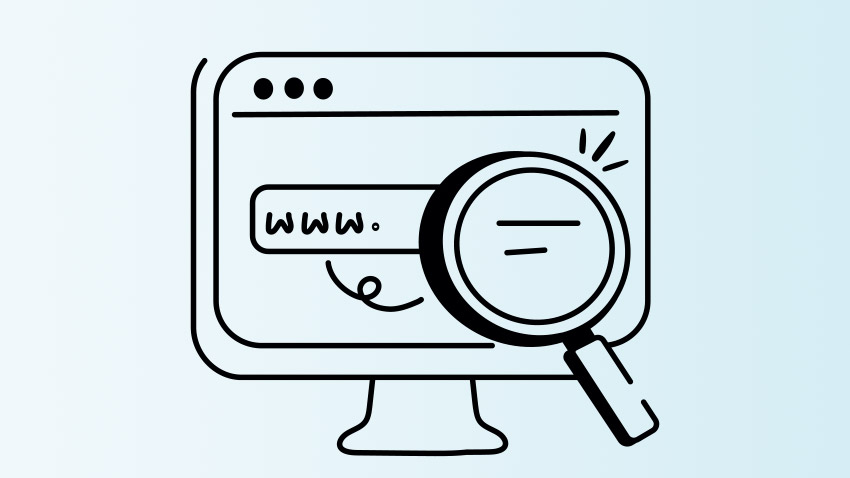Anyone wishing to create a web project, be it an e-commerce site, a personal blog, or a company website, must first face the task of choosing a domain name. But how does one select the right domain for their needs?
Choose a domain name that won’t need changing
To start on the right foot, every detail needs careful consideration, as your online presence and livelihood are at stake. It’s wise to opt for a domain that remains relevant over time. Changing a domain name involves significant work and can sometimes have adverse effects, such as impacting your Search Engine Result Page (SERP) ranking. Therefore, make an informed decision from the outset.
While technical aspects should be handled with the utmost care, the consequences for personal branding, instant recognisability and content distribution should not be underestimated.
Choosing an effective domain name is crucial for launching a web project and standing out from future competitors. It also plays a key role in communicating the mission, objectives, and values of the project. There are, however, some principles that should be followed when choosing and buying a domain to benefit your web project.
TLD above all else
When creating a website, the Top-Level Domain (TLD) cannot be neglected. This extension conveys important information to anyone navigating the web, such as the sector or main aim of the website.
There are two main groups of TLDs relevant to private individuals: generic TLDs and country code TLDs. Generic TLDs indicate the scope of the project, while country code TLDs refer to specific geographical locations or territories. If your target audience is within a specific country or region, opting for a country code TLD is advisable. Conversely, if you aim to reach a global audience, a generic TLD might be more appropriate.
While there are countless TLDs available, there is no need to purchase them all. However, it can be sensible to acquire the most popular domain extensions to protect your brand. This strategy helps prevent your brand name from falling into someone else’s hands. You might also want to look into domain monitoring services for this very purpose.
A domain name for communicating
A domain name is essentially micro-content that appears on user SERPs and major social network sites. Therefore, it can be leveraged to communicate vital information about the business to potential users. Pinpointing the main scope of the web project is also crucial for engaging as many readers as possible and broadening your target audience.
Consider the following examples:
- breadandbiscuits.com
- fruitonline.eu
- Freshpastaonline.store
In these hypothetical domains, the main topic of each website is clear. Choosing an effective domain means being able to communicate both the vision and focus of the web project in as few characters as possible – this can be a challenging decision.
It may take time, or you might have a flash of inspiration, but additional brainstorming sessions might be necessary. Alternatively, using web-based tools such as the Aruba Domains search with AI feature can efficiently help generate valid and available domain name ideas.
For example, if you want to start a fashion blog, many freelancers opt for a name + surname combination, as their work is front and centre. If the website is linked to a trade mark, specific product, or company, the domain name should directly represent the objective of the web project.
Once you’ve settled on a domain name, registration should follow. Before committing, ensure you’re addressing your target audience and clearly communicating the main objective of the product to impart trustworthiness from the get go.
Tips and tricks on how to choose a domain name
There are several standard practices for crafting a suitable domain name, which, as discussed, should be chosen with meticulous attention and reflection. After all, it is the calling card of the website that will appear not only on SERPs and social media but also on private messaging services such as WhatsApp, Telegram, and newsletters.
The musts:
- Easy to pronounce
- Easy to spell and type (no accented letters or symbols)
- No intricate puns or contradictions
- Concise and to the point
- No articles or prepositions
As soon as you’ve decided on a name, read it and say it aloud to see how it sounds. Have colleagues, friends, and family read it and provide feedback. This might not yield the final solution, but getting external opinions is always valuable.
Keywords will naturally show up if your web copy is written organically. This means that keywords should flow from your content and not the other way around. No blogger would structure a text around a set of keywords, as it would seem too forced.
Name taken? Hire a broker
What if your preferred domain is already taken? This is where brokerage services come in handy. If your desired domain is unavailable, a brokerage team can step in to try to secure it for you. They will help you set a realistic budget and handle the entire negotiation process. This service is definitely worth considering to increase your chances of obtaining the perfect domain name for your web project, ensuring your online presence is as strong and effective as possible.
To sum up
Choosing a name and purchasing a domain are significant decisions when creating an e-commerce site, personal blog, or webpage. When selecting a name for your web project, transparency always wins. Communicating your identity and providing clear answers with an effective domain name is what will make you stand out from the rest.











